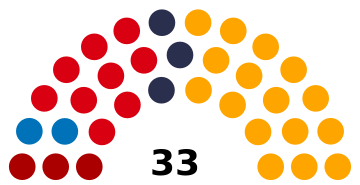This article needs to be updated.(October 2025) |
Political System of Artsakh Արցախի հանրապետության պետական համակարգ | |
|---|---|
 | |
| Polity type | Unitary presidential republic |
| Constitution | Constitution of Artsakh |
| Formation | December 10, 1991 |
| Legislative branch | |
| Name | National Assembly |
| Type | Unicameral |
| Presiding officer | Ashot Ghulian, President of the National Assembly |
| Executive branch | |
| Head of state and government | |
| Title | President |
| Currently | Arayik Harutyunyan |
| Cabinet | |
| Current cabinet | Second Harutyunyan government |
| Ministries | 15 |
 |
|---|
| |
Politics of Artsakh took place within the constraints of a written constitution, approved by a popular vote, that recognises three branches of government: executive, legislative and judicial. The executive branch of government was exercised within a framework of a presidential representative democratic republic, whereby the President of Artsakh was both the head of state and the head of government. The legislative branch of government was composed of both the Government and the National Assembly. Elections to the National Assembly were on the basis of a multi-party system. As of 2009, the American-based non-governmental organisation, Freedom House, ranks Artsakh above both Armenia and Azerbaijan in terms of political and civil rights. [1] [2] [3] The republic was de facto independent and de jure a part of Azerbaijan. None of the elections in Artsakh were recognised by international bodies such as the OSCE Minsk Group, the European Union or the Organisation of Islamic Cooperation. Both Azerbaijan and Turkey had condemned the elections and called them a source of increased tensions. [4] [5] [6]
Contents
- Executive branch
- Current government
- Legislative branch
- Judicial branch
- Latest elections
- Presidential election
- Parliamentary election
- Political parties
- See also
- References
- External links
Following the Azerbaijani offensive on 19 September 2023, Artsakh agreed to dissolve itself by 1 January 2024, [7] however instead of dissolving, they established a government-in-exile in Yerevan, Armenia. [8] The Prime Minister of Armenia, Nikol Pashinyan, has since severely opposed the government-in-exile's existence in Armenia. [9] [10]





